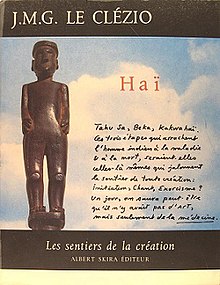Haï
Appearance
 First edition | |
| Author | J. M. G. Le Clézio |
|---|---|
| Language | French |
| Genre | Essay |
| Publisher | Editions d'art Albert Skira,Les Sentiers de la création, Geneva |
Publication date | 1971 |
| Publication place | France |
| Media type | |
| Pages | 170 |
| ISBN | 978-2-605-00112-5 |
| OCLC | 246772402 |
| LC Class | F1565.3.P45 C54 1987 |
“Haï” is an essay written by French Nobel laureate J. M. G. Le Clézio.
Subject
[edit]Recurrent images are the sun and the sea, light and water. From 1969 to 1973 Le Clézio lived among the Emberá speaking Indians in Panama.[1][2]
Quote
[edit]"But " for the Indian, music has no beginning, no end, no climax[3]
Explanation of "Haï"
[edit]Haï could br translated from French into English as Chai. Chai is a symbol and word that figures prominently in Jewish culture and consists of the letters of the Hebrew alphabet Het (ח) and Yod (י)
Publication history
[edit]First
[edit]- Haï. Geneva, Switzerland: Editions d'art Albert Skira,Les Sentiers de la création. 1971. ISBN 978-2-605-00112-5.
1971, France,Editions d'art Albert Skira,Les Sentiers de la création, Geneva
ISBN 978-2-605-00112-5
Reprint
[edit]It was reprinted by Flammarion, Paris in 1987.
References
[edit]- ^ Liukkonen, Petri. "Le Clézio". Books and Writers (kirjasto.sci.fi). Finland: Kuusankoski Public Library. Archived from the original on 12 October 2008. Retrieved 8 December 2008.. Quote: "In the late 1960s and early 1970s he lived among a tribe of Embera Indians in the Panamanian jungle, writing about his experiences"
- ^ "Jean-Marie Le Clézio". msn Encarta. ninmsn PTY LTD. 2008. Archived from the original on 2024-05-24. Retrieved 2008-11-20.
This essay is a lyrical account of the author's experience which, as he has confessed, changed his whole life. On the whole, the natural environment, animate and inanimate, forms a kind of philosophical, unifying ground for Le Clézio's themes"
- ^ Le Clézio (1971). Haï. Skira, Geneva. pp. 51–52. ISBN 0253208521.
